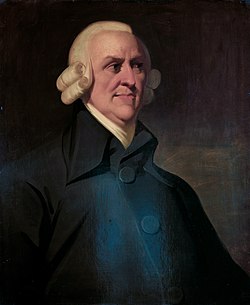
Back Adam Smith Afrikaans Adam Smith ALS አዳም ስሚስ Amharic Adam Smith AN ऐडेम स्मिथ ANP آدم سميث Arabic ادم سميث ARZ এডাম স্মিথ Assamese Adam Smith AST एडम स्मिथ AWA
Adam Smith | |
|---|---|
 Posthumous Muir portrait, c. 1800 | |
| Born | c. 16 June [O.S. c. 5 June] 1723[1] Kirkcaldy, Fife, Scotland, Great Britain |
| Died | 17 July 1790 (aged 67) Edinburgh, Scotland |
| Education | |
| Alma mater | |
| Philosophical work | |
| Era | Early modern period |
| Region | Western philosophy |
| Main interests | Political philosophy, ethics, economics |
| Notable works |
|
| Notable ideas | |
| Signature | |
| Part of the behavioral sciences |
| Economics |
|---|
 |
|
|
Adam Smith (baptised 16 June [O.S. 5 June] 1723[1] – 17 July 1790) was a Scottish[a] economist and philosopher who was a pioneer in the field of political economy and key figure during the Scottish Enlightenment.[3] Seen by some as the "father of economics"[4] or the "father of capitalism".[5] He is known for two classic works: The Theory of Moral Sentiments (1759) and An Inquiry into the Nature and Causes of the Wealth of Nations (1776). The latter, often abbreviated as The Wealth of Nations, is regarded as his magnum opus, marking the inception of modern economic scholarship as a comprehensive system and an academic discipline. Smith refuses to explain the distribution of wealth and power in terms of divine will and instead appeals to natural, political, social, economic, legal, environmental and technological factors, as well as the interactions among them. The work is notable for its contribution to economic theory, particularly in its exposition of concept of absolute advantage.[6]
Smith studied social philosophy at the University of Glasgow and at Balliol College, Oxford, where he was one of the first students to benefit from scholarships set up by John Snell. Following his graduation, he delivered a successful series of public lectures at the University of Edinburgh,[7] that met with acclaim. This led to a collaboration with David Hume during the Scottish Enlightenment. Smith obtained a professorship at Glasgow, where he taught moral philosophy. During this period, he wrote and published The Theory of Moral Sentiments. Subsequently, he assumed a tutoring position that facilitated travel throughout Europe, where he encountered intellectual figures of his era.
In response to the prevailing policy of safeguarding national markets and merchants through the reduction of imports and the augmentation of exports, a practice that came to be known as mercantilism, Smith laid the foundational principles of classical free-market economic theory. The Wealth of Nations was a precursor to the modern academic discipline of economics. In this and other works, he developed the concept of division of labour and expounded upon how rational self-interest and competition can lead to economic prosperity. Smith was controversial in his day and his general approach and writing style were often satirised by writers such as Horace Walpole.[8]
- ^ a b "Adam Smith (1723–1790)". BBC. Archived from the original on 15 March 2007. Retrieved 20 December 2019.
Adam Smith's exact date of birth is unknown, but he was baptised on 5 June 1723.
- ^ Williams, Gwydion M. (2000). Adam Smith, Wealth Without Nations. London: Athol Books. p. 59. ISBN 978-0-85034-084-6. Archived from the original on 19 July 2021. Retrieved 24 August 2020.
- ^ "BBC – History – Scottish History". www.bbc.co.uk. Archived from the original on 10 April 2001. Retrieved 20 December 2019.
- ^ —Brown, Vivienne (5 December 2008). "Mere Inventions of the Imagination': A Survey of Recent Literature on Adam Smith". Cambridge University Press. 13 (2): 281–312. doi:10.1017/S0266267100004521. ISSN 0266-2671. S2CID 145093382. Archived from the original on 21 July 2020. Retrieved 20 July 2020.
—Berry, Christopher J. (2018). Adam Smith Very Short Introductions Series. Oxford University Press. p. 101. ISBN 978-0-19-878445-6. Archived from the original on 19 July 2021. Retrieved 3 October 2020.
—Sharma, Rakesh. "Adam Smith: The Father of Economics". Investopedia. Archived from the original on 10 September 2016. Retrieved 20 February 2019. - ^ —"Adam Smith: Father of Capitalism". www.bbc.co.uk. Archived from the original on 20 November 2017. Retrieved 20 February 2019.
—Bassiry, G. R.; Jones, Marc (1993). "Adam Smith and the ethics of contemporary capitalism". Journal of Business Ethics. 12 (1026): 621–627. doi:10.1007/BF01845899. S2CID 51746709.
—Newbert, Scott L. (30 November 2017). "Lessons on social enterprise from the father of capitalism: A dialectical analysis of Adam Smith". Academy of Management Journal. 2016 (1): 12046. doi:10.5465/ambpp.2016.12046abstract. ISSN 2151-6561.
—Rasmussen, Dennis C. (2017). The Infidel and the Professor: David Hume, Adam Smith, and the Friendship That Shaped Modern Thought. Princeton University Press. p. 12. ISBN 978-1-4008-8846-7. - ^ "Absolute Advantage – Ability to Produce More than Anyone Else". Corporate Finance Institute. Archived from the original on 20 February 2019. Retrieved 20 February 2019.
- ^ "Adam Smith: Biography on Undiscovered Scotland". www.undiscoveredscotland.co.uk. Archived from the original on 22 July 2019. Retrieved 30 July 2019.
- ^ John, McMurray (19 March 2017). "Capitalism's 'Founding Father' Often Quoted, Frequently Misconstrued". Investor's Business Daily. Archived from the original on 19 July 2021. Retrieved 31 May 2019.
Cite error: There are <ref group=lower-alpha> tags or {{efn}} templates on this page, but the references will not show without a {{reflist|group=lower-alpha}} template or {{notelist}} template (see the help page).
© MMXXIII Rich X Search. We shall prevail. All rights reserved. Rich X Search